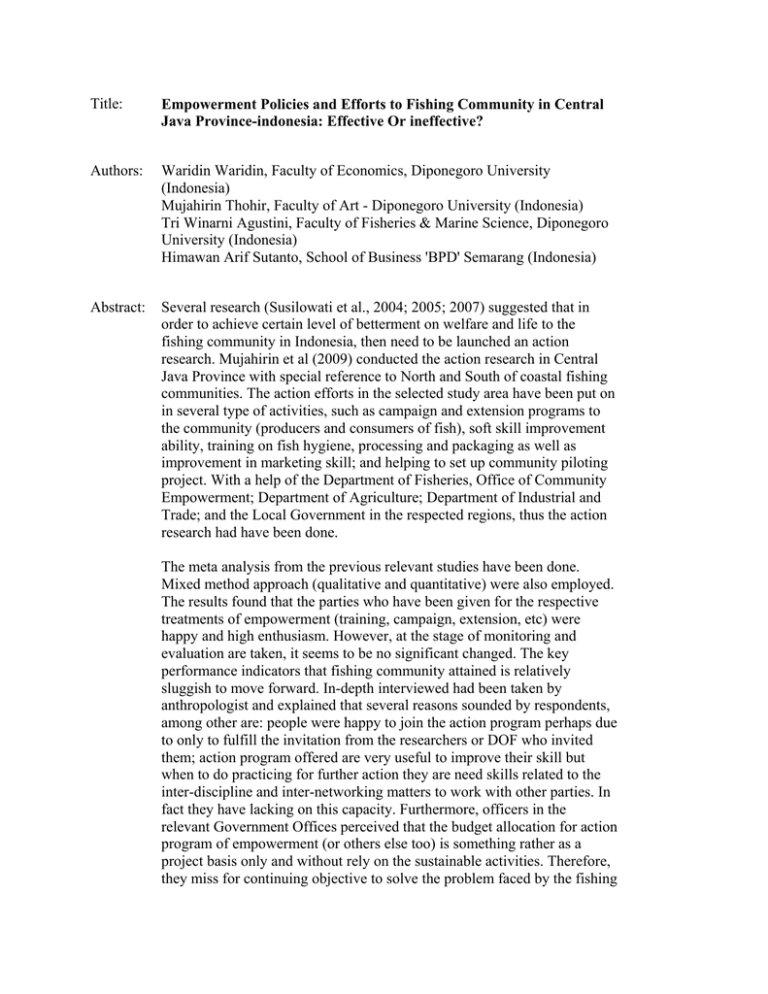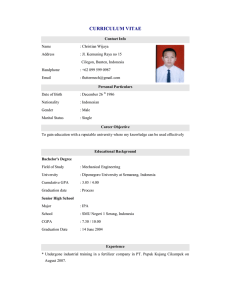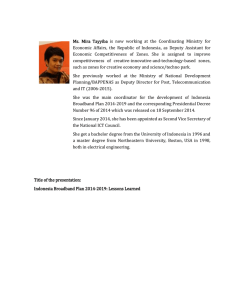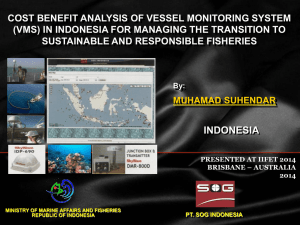Title: Empowerment Policies and Efforts to Fishing Community in Central
advertisement

Title: Empowerment Policies and Efforts to Fishing Community in Central Java Province-indonesia: Effective Or ineffective? Authors: Waridin Waridin, Faculty of Economics, Diponegoro University (Indonesia) Mujahirin Thohir, Faculty of Art - Diponegoro University (Indonesia) Tri Winarni Agustini, Faculty of Fisheries & Marine Science, Diponegoro University (Indonesia) Himawan Arif Sutanto, School of Business 'BPD' Semarang (Indonesia) Abstract: Several research (Susilowati et al., 2004; 2005; 2007) suggested that in order to achieve certain level of betterment on welfare and life to the fishing community in Indonesia, then need to be launched an action research. Mujahirin et al (2009) conducted the action research in Central Java Province with special reference to North and South of coastal fishing communities. The action efforts in the selected study area have been put on in several type of activities, such as campaign and extension programs to the community (producers and consumers of fish), soft skill improvement ability, training on fish hygiene, processing and packaging as well as improvement in marketing skill; and helping to set up community piloting project. With a help of the Department of Fisheries, Office of Community Empowerment; Department of Agriculture; Department of Industrial and Trade; and the Local Government in the respected regions, thus the action research had have been done. The meta analysis from the previous relevant studies have been done. Mixed method approach (qualitative and quantitative) were also employed. The results found that the parties who have been given for the respective treatments of empowerment (training, campaign, extension, etc) were happy and high enthusiasm. However, at the stage of monitoring and evaluation are taken, it seems to be no significant changed. The key performance indicators that fishing community attained is relatively sluggish to move forward. In-depth interviewed had been taken by anthropologist and explained that several reasons sounded by respondents, among other are: people were happy to join the action program perhaps due to only to fulfill the invitation from the researchers or DOF who invited them; action program offered are very useful to improve their skill but when to do practicing for further action they are need skills related to the inter-discipline and inter-networking matters to work with other parties. In fact they have lacking on this capacity. Furthermore, officers in the relevant Government Offices perceived that the budget allocation for action program of empowerment (or others else too) is something rather as a project basis only and without rely on the sustainable activities. Therefore, they miss for continuing objective to solve the problem faced by the fishing community. The study is prematurely conclude that the efforts and/ or policies on empowerment to the fishing community in Indonesia and particularly in Central Java Province is indeed need to be reviewed again and of course redesigning the scheme properly to meet the favorable conditions among the stakeholders is highly prioritized.



